9 start with M start with M
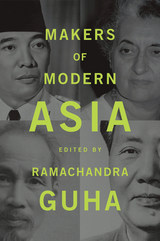
Hardly more than a decade old, the twenty-first century has already been dubbed the Asian Century in recognition of China and India’s increasing importance in world affairs. Yet discussions of Asia seem fixated on economic indicators—gross national product, per capita income, share of global trade. Makers of Modern Asia reorients our understanding of contemporary Asia by highlighting the political leaders, not billionaire businessmen, who helped launch the Asian Century.
The nationalists who crafted modern Asia were as much thinkers as activists, men and women who theorized and organized anticolonial movements, strategized and directed military campaigns, and designed and implemented political systems. The eleven thinker-politicians whose portraits are presented here were a mix of communists, capitalists, liberals, authoritarians, and proto-theocrats—a group as diverse as the countries they represent.
From China, the world’s most populous country, come four: Mao Zedong, leader of the Communist Revolution; Zhou Enlai, his close confidant; Deng Xiaoping, purged by Mao but rehabilitated to play a critical role in Chinese politics in later years; and Chiang Kai-shek, whose Kuomintang party formed the basis of modern Taiwan. From India, the world’s largest democracy, come three: Mohandas Gandhi, Jawaharlal Nehru, and Indira Gandhi, all of whom played crucial roles in guiding India toward independence and prosperity. Other exemplary nationalists include Vietnam’s Ho Chi Minh, Indonesia’s Sukarno, Singapore’s Lee Kuan Yew, and Pakistan’s Zulfiqar Ali Bhutto. With contributions from leading scholars, Makers of Modern Asia illuminates the intellectual and ideological foundations of Asia’s spectacular rise to global prominence.
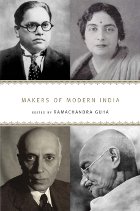
Modern India is the world's largest democracy, a sprawling, polyglot nation containing one-sixth of all humankind. The existence of such a complex and distinctive democratic regime qualifies as one of the world's bona fide political miracles. Furthermore, India's leading political thinkers have often served as its most influential political actors—think of Gandhi, whose collected works run to more than ninety volumes, or Ambedkar, or Nehru, who recorded their most eloquent theoretical reflections at the same time as they strove to set the delicate machinery of Indian democracy on a coherent and just path.
Out of the speeches and writings of these thinker-activists, Ramachandra Guha has built the first major anthology of Indian social and political thought. Makers of Modern India collects the work of nineteen of India's foremost generators of political sentiment, from those whose names command instant global recognition to pioneering subaltern and feminist thinkers whose works have until now remained obscure and inaccessible. Ranging across manifold languages and cultures, and addressing every crucial theme of modern Indian history—race, religion, language, caste, gender, colonialism, nationalism, economic development, violence, and nonviolence—Makers of Modern India provides an invaluable roadmap to Indian political debate.
An extensive introduction, biographical sketches of each figure, and guides to further reading make this work a rich resource for anyone interested in India and the ways its leading political minds have grappled with the problems that have increasingly come to define the modern world.

Runaway medical costs, long-term care, market competition, for-profit medicine, nursing shortages—these are but a few of the issues that swirl around in the late twentieth century’s volatile health care scene. How much of the system do we want to change, and how much do we want to keep? Health policy expert Eli Ginzberg examines such crucial questions in his characteristically broad-gauged perspective. Framing the issues in their historical, political, and professional contexts, the author analyzes how we have arrived at the current crisis.
The book focuses on the three sides of the medical triangle that have separate and sometimes conflicting goals: the physicians want to provide the most health care for the most money; the government, which furnishes 40 percent of the system's funding, wants to limit the money it pays out for health care; and the public, with over a billion annual visits to doctors, wants the most health care for the least money.
Ginzberg explains how the core components of our health care system—the community hospital and physicians who have long practiced in a fee-for-service mode—are under attack, and he indicates the factors that make it uncertain whether the destabilization will slow down or accelerate. Moreover, can key health care centers maintain their leadership in a time when new dollars for health are scarce? How will the floundering state of foundations affect medical care in local communities?
In his final chapters the author zeroes in on the special concerns of the public: high-need patients (including those suffering from cancer, catastrophic illness, and the infirmities of old age, or those who are mentally ill or chronically poor), nursing shortages, unsuccessful cost containment, and lack of consensus within the medical triangle about the major issues on our nation's health agenda.
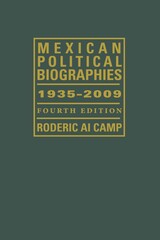
This fourth edition of Roderic Camp's highly respected Mexican Political Biographies is an updated comprehensive biographical directory of leading state and national politicians in Mexico, covering the years 1935–2009. The original edition, published in 1976, was the first and only comprehensive biographical work on contemporary political figures in any language and served as the prototype for the Mexican government's brief foray into its own official biographical directory. The Mexican Supreme Court has cited every biography of justices in the third edition as the basis of its biographies in the late 1980s.
With updates of the existing biographies and appendices, plus almost 1,000 additional biographies, this fourth edition now features close to 3,000 entries and serves as a unique resource list of the chronological occupants of all leading national political posts. The need for such information has become even more pronounced since Mexico's political transformation from a semi-authoritarian to a democratic model.
This latest edition allows readers access to information about Mexican politicians into the new century, and like its earlier versions, will be a valuable tool for government officials, journalists, historians, social scientists, the business community, and students.
Finally, it includes a detailed bibliographic essay that identifies and explains the significance of biographical sources and has been enhanced by numerous up-to-date Internet sources. An added convenience is an accompanying CD that allows readers to search the biographies and appendices, enhancing the longevity, usefulness, and uniqueness of this edition.

Surveys reveal that a majority of Americans believe government is run for special interests, not public interest. The increased presence and power of lobbyists in Washington and the excesses of PAC and campaign contributions, in-kind benefits, and other favors would seem to indicate a government of weak public servants corrupted by big private-interest groups.
But as Fred McChesney shows, this perspective affords only a partial understanding of why private interests are paying, and what they are paying for. Consider, for example, Citicorp, the nation's largest banking company, whose registered lobbyists spend most of their time blocking legislation that could hurt any one of the company's credit-card, loan, or financial-service operations. What this scenario suggests, the author argues, is that payments to politicians are often made not for political favors, but to avoid political disfavor, that is, as part of a system of political extortion or "rent extraction."
The basic notion of rent extraction is simple: because the state can legally take wealth from its citizens, politicians can extort from private parties payments not to expropriate private wealth. In that sense, rent (that is, wealth) extraction is "money for nothing"--money paid in exchange for politicians' inaction. After constructing this model of wealth extraction, McChesney tests it with many examples, including several involving routine proposals of tax legislation, followed by withdrawal for a price. He also shows how the model applies more generally to regulation. Finally, he examines how binding contracts are written between private interests and politicians not to extract wealth.
This book, standing squarely at the intersection of law, political science, and economics, vividly illustrates the patterns of legal extortion underlying the current fabric of interest-group politics.
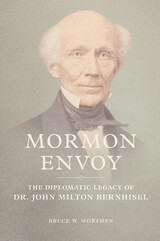
Having risen from a Pennsylvania backcountry upbringing to become a respected member of the upper class, Bernhisel possessed a personal history that allowed him to reach common ground with politicians and other outsiders. He negotiated for Joseph Smith’s life and, after the Church’s relocation to the Utah Territory, took on the task of rehabilitating the public image of the Latter-day Saints. Brigham Young’s defiance of the government undermined Bernhisel’s work, but their close if sometimes turbulent relationship ultimately allowed Bernhisel to make peace with Washington, secure a presidential pardon for Young, and put Utah and the Latter-day Saints on the road to formally joining the United States.

Tom Gola is a Philadelphia Big Five basketball icon. He led La Salle to the NIT championship in 1952 and the NCAA championship in 1954, and holds the NCAA record for most rebounds in a career. Gola also helped the Philadelphia Warriors win the NBA championship as a rookie in 1956 and was named an All-Star five times before retiring in 1966. But Gola also had many amazing achievements as a coach; his La Salle Explorer teams were a large part of the national basketball landscape. He was inducted into the Naismith Memorial Basketball Hall of Fame in 1976.
In Mr. All-Around, avid sports fan and reporter David Grzybowski provides a definitive biography of Gola. He uses exclusive interviews he conducted with Gola in 2013 and features anecdotes by many figures of Philadelphia and basketball history, including John Cheney, Fran Dunphy, and Lionel Simmons.
After the NBA, Gola transitioned to a second career as a politician, serving as Pennsylvania State Representative and Philadelphia City Controller. His dedication to public service involved joining politician Arlen Specter on a campaign that revolutionized political marketing within Philadelphia. Mr. All-Around is an affectionate testament to the life, career, and legacy of one of Philadelphia’s most beloved sports legends.
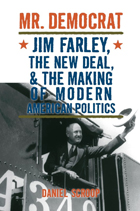
Mr. Democrat tells the story of Jim Farley, Franklin D. Roosevelt's campaign manager. As party boss, Farley experienced unprecedented success in the New Deal years. And like his modern counterpart Karl Rove, Farley enjoyed unparalleled access and power. Unlike Rove, however, Farley was instrumental in the creation of an overwhelming new majority in American politics, as the emergence of the New Deal transformed the political landscape of its time.
Mr. Democrat is timely and indispensable not just because Farley was a fascinating and unduly neglected figure, but also because an understanding of his career advances our knowledge of how and why he revolutionized the Democratic Party and American politics in the age of the New Deal.
Daniel Scroop is Lecturer in American History, University of Liverpool School of History.
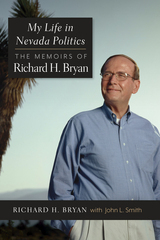
Born in Washington, D.C. in 1937, Bryan grew up in Las Vegas. His interest in politics started early, winning school-class elections and expressing a personal goal of one day becoming Governor of Nevada. He was elected student body president at the University of Nevada.
His career in public service began as a deputy district attorney in Clark County. In 1966, he became the first county public defender in state history. Bryan served in the Nevada Legislature in both the Assembly and Senate before winning the statewide office of Attorney General in 1978. He was elected Nevada Governor in 1982, winning re-election in 1986. Bryan was elected to the U.S. Senate in 1988, reelected in 1994, and served on the committees on Commerce, Banking, Taxation, and Intelligence, and chaired the Ethics Committee. He retired from the Senate in 2001 and returned to Nevada.
Bryan’s list of accomplishments is extensive. He was largely responsible for the early call-to-arms in the fight against the Department of Energy’s attempt to create a nuclear waste repository at Yucca Mountain. As governor, he reorganized state economic development programs, improved environmental protections for Lake Tahoe and other threatened areas, and made unprecedented appointments of women. In the Senate, Bryan authored the Southern Nevada Public Lands Management Act and the National Conservation Area for the High Rock Desert country. He had a front-row seat to the historic buildup to the Iraq War and the impeachment of President Bill Clinton. In retirement, Bryan continues to serve the state through his participation on a wide range of committees.
Throughout his political career, Bryan, with wife Bonnie at his side, traversed Nevada from its tiniest hamlets to the metro areas of Reno and Las Vegas with unrivaled zeal in his efforts to represent the state’s citizens. He is famous for knowing thousands of his constituents not only by their first names, but also recalling details of their lives. The simple fact is, while in service to Nevada, Bryan was in his element in the place he loves best.
READERS
Browse our collection.
PUBLISHERS
See BiblioVault's publisher services.
STUDENT SERVICES
Files for college accessibility offices.
UChicago Accessibility Resources
home | accessibility | search | about | contact us
BiblioVault ® 2001 - 2024
The University of Chicago Press









